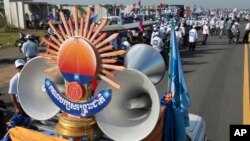The European Union in Cambodia on Tuesday said it was suspending planned funding of Cambodia’s national election body.
The United States last month said it would suspend its funding of the National Election Committee and also imposed visa restrictions on officials over the dissolution of the opposition Cambodia National Rescue Party and arrest of its leader, Kem Sokha.
In a statement, the E.U. said the CNRP’s dissolution meant the government could not organize a legitimate election process in 2018 as planned.
“The decision to dissolve the CNRP, and the subsequent reallocation of its National Assembly and commune/sangkat council seats to other parties deny the choice of those who voted for the party in the elections in 2013 and 2017,” it said.
“An electoral process from which the main opposition party has been arbitrarily excluded cannot be seen as legitimate,” the statement reads.
The E.U. had previously announced some $8 million of funding for next year’s general election.
It said high voter turnout in local elections earlier this year was evidence that the population was growing more confident in the electoral system. The CNRP won about 43 percent of the popular vote in the commune elections.
Despite the withdrawal of E.U. funding, NEC officials said the move would not impact the NEC’s ability to hold an election as it had lined up funding from the government and other donors, including China.
Som Sorida, NEC deputy secretary-general, said it had set aside about $52 million for the 2018 election.
However, he added that the NEC was disappointed by the loss of a partner.
“The participation from more partners will show more transparency of the NEC in the electoral process,” he said.
He added that Japan was providing some $7 million towards election costs, while China, South Korea, and Russia were also making contributions.
Hironori Suzuki, counselor of the Embassy of Japan in Cambodia, said in an email: “It is of utmost importance to have next year’s national election reflect the will of Cambodian people. Japan will keep a dialogue with the royal government of Cambodia, will monitor the development of the situation closely with strong interest, and will continue to provide electoral reform assistance.”
Hang Puthea, NEC spokesman, said China was the largest single donor, providing about $12 million.
Phay Siphan, government spokesman, said the E.U. was “interfering in Cambodian affairs” and making an “attack on an independent body.”
Hun Sen, who has been in power for more than three decades, said in November that foreign recognition of the 2018 election was not necessary for it to be legitimate.
The increasing tensions with the West come as Cambodia is drawing increasingly close to Beijing, which is offering political and economic support to Hun Sen.







